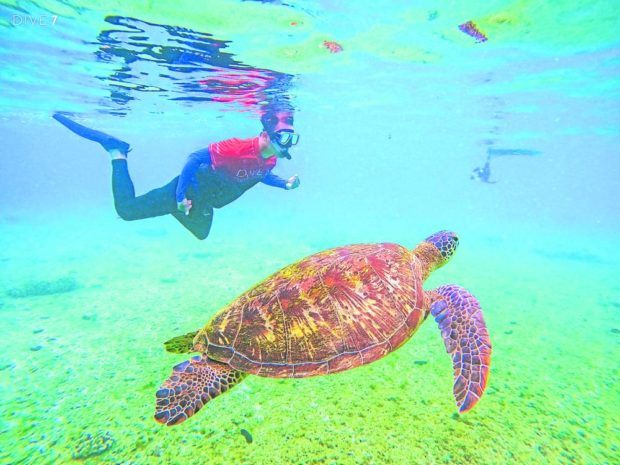
PLAYTIME A diver swims with a green sea turtle, one of the main attractions on Apo Island, in this undated photo. —DEPARTMENT OF TOURISM-CENTRAL VISAYAS PHOTO
DUMAGUETE CITY—Local officials of Dauin town in Negros Oriental want to put up a floating wharf on the 74-hectare diving haven Apo Island, much to the chagrin of environmentalists.
Scientists from the Coastal Conservation and Education Foundation Inc. and the Silliman University Institute of Environmental and Marine Sciences appealed to the Apo Island’s Protected Areas Management Board (PAMB) to carefully deliberate on the disadvantages of the proposal, and consider the science behind it.
Apo Island, the country’s premiere model of community-based coastal resources management off the coast of Dauin, about 16 kilometers south of Dumaguete City, will get a P207-million face-lift aimed at providing “ease and convenience in travel, transport of goods, and delivery of medical services” to the island, said Apo’s village chief, Mario Pascobello.
“This (floating wharf) will provide safety and comfort not only to the people of Apo but also to tourists, especially the aged and the handicapped,” Pascobello said.
The Department of Environment and Natural Resources’ Apo Island Protected Landscape and Seascape-PAMB gave the municipality of Dauin a clearance in November 2022 to apply for an Environmental Compliance Certificate to build a jetty port on the island.
Income from tourism alone at Apo Island during the prepandemic period was highest at P14 million, coming only from entrance fees, snorkeling and scuba diving fees.
Prepandemic records at the PAMB showed that about 20 to 40 boats docked on Apo Island each day, bringing in more than 200 tourists on the average.
Income from boat rentals, souvenirs and eating places were earned by the residents themselves. Income from green turtle-related activities, on the other hand, went to the Apo Island Snorkeling Equipment Rental and Guiding Association.
Movable port
Pascobello said the proposed movable port would be stationed at Cogon Point from July to September during habagat (southeast monsoon), and towed to the Baybay area by October during amihan (northwest monsoon).
Baybay is near the Chapel Point coral reef, the habitat of green turtles where snorkeling is popular. Cogon Point is about a kilometer from the Apo Island Marine Sanctuary in Purok Ubos where scuba diving is regulated. INQ